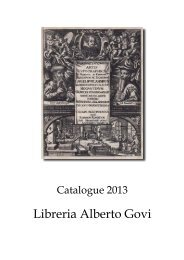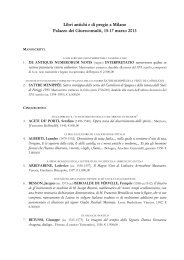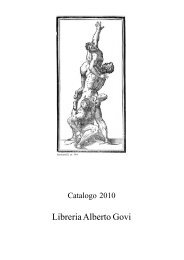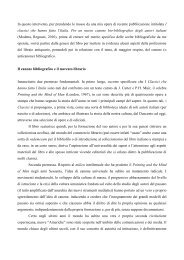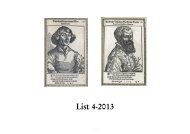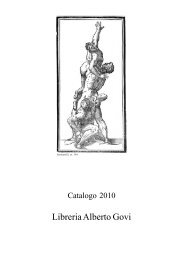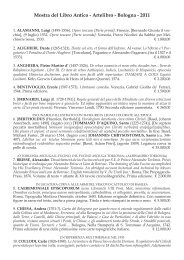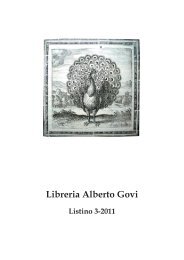List 1-2013.pdf - Libreria Antiquaria Alberto Govi
List 1-2013.pdf - Libreria Antiquaria Alberto Govi
List 1-2013.pdf - Libreria Antiquaria Alberto Govi
You also want an ePaper? Increase the reach of your titles
YUMPU automatically turns print PDFs into web optimized ePapers that Google loves.
Lodovico Castelvetro, born in 1505 in Modena, Italy, expressed an early passion for the study of humanistic letters. He pursued a course<br />
of study at the Universities of Bologna, Ferrara, Padua, and Siena. Bowing to his father’s wishes, Castelvetro earned a doctorate of law<br />
at Siena before moving to Rome, where his family hoped that his maternal uncle, Giovanni Maria della Porta, would be able to use his<br />
political connections to advance his nephew’s career. Finding life in Rome unbearable, around the time of its sack in 1527 by the imperial<br />
forces of Charles V, Castelvetro returned to Modena, where he found intellectual satisfaction in the company of the humanists allied with<br />
Giovanni Grilenzono’s circle of friends. Castelvetro and Grilenzono studied ancient languages while also practicing vernacular languages.<br />
Under Castelvetro’s leadership, humanist scholarship flourished in Modena, with Castelvetro’s contemporaries referring to him as “another<br />
Socrates.” Castelvetro’s association with the allegedly heretical Academy of Modena culminated in what may have been an unfounded accusation<br />
to the Sacred Inquisition of Rome. His criticism of Annibal Caro’s poetic sequence written in praise of the Farnese family and the<br />
royal house of France initiated Caro’s systematic persecution of Castelvetro, a literary quarrel that further defamed Castelvetro’s character<br />
in the eyes of his contemporaries. Castelvetro found himself in the position of having to travel to Rome in 1560 to refute the accusation.<br />
Threatened with torture, Castelvetro fled Italy, was excommunicated, and remained living in exile for the next ten years of his life. After<br />
leaving Rome, Castelvetro found temporary refuge in Ferrara, Chiavenna, Lyons, Geneva, and, finally, Vienna, where Emperor Maximilian<br />
II’s patronage provided the opportunity for Castelvetro to publish his most significant literary contribution: his commentary on Aristotle’s<br />
Poetics (1570). In his dedicatory epistle to Emperor Maximilian II, Castelvetro avowed his intent to complete Aristotle’s unpolished treatise<br />
in order to prescribe rules for writing dramas. In it he also emphasized realism in drama, clarified the distinction between rhetoric and<br />
poetry, and defended poetry as a means of pleasure alone as opposed to the earlier opinion that poetry should instruct as well as delight.<br />
Another critical notion that Castelvetro took issue with was the Platonic concept that poets are possessed with a divine sort of madness. Castelvetro<br />
asserted that this was a myth perpetuated by the ignorant masses and by poets themselves. Additional commentaries on Petrarch’s<br />
Rime, published in 1582, and on the first twenty-nine cantos of Dante’s Inferno, among other textual corrections and considerations of the<br />
development of the Italian language, comprise the remainder of Castelvetro’s critical endeavours. While still in exile, Castelvetro died on<br />
February 21, 1571 (cfr. D. Cantimori, Eretici italiani del Cinquecento, Firenze, 1939, pp. 553-556; and Dizionario Biografico degli Italiani,<br />
XXII, 1979, by V. Marchetti and G. Patrizi).<br />
Little is known about the life of Francesco Giuntini. Born in Florence, he entered the Carmelitan order in 1551 and obtained a degree<br />
in theology from the university of Pisa. In 1554 he was named provincial of his order. For some heretical views he was arrested and tortured,<br />
but managed to escape to France. In 1561 he reached Lyon, where he stayed for the rest of his life. He became editor to the printers<br />
Rouillé and Giunta, and acquired international defame as a competent astrologer. He became chaplain to the youngest son of Catherine de’<br />
Medici, François d’Alençon, duke of Anjou. His main work, Speculum astrologiae (Lyon, 1573), was a comprehensible treatise defending<br />
‘good astrology’ and it contains furthermore an edition of Ptolemy’s Tetrabiblos and numerous horoscopes of famous men. He died in<br />
1590, according to some rumours slain by a bookshelf in his library (cf. G. Bacchi, Frate Pacifico Giuntini, in: “Rivista Storica Carmelitana”,<br />
2, 1930, pp. 94-103; and F. Savorgnan di Brazzà, Gli scienziati italiani in Francia, Roma, 1941, pp. 15-17; and G. Albassio, Bio-<br />
- 18 -



